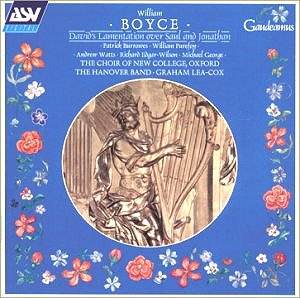WILLIAM BOYCE
David's Lamentation over Saul and Jonathan. Ode for St Cecilia's Day
The Charms of Harmony Display.- first version.
 Patrick Burrowes (boy soprano),
William Purefoy (alto), Andrew Watts (counter-tenor), Richard Edgar-Wilson
(tenor), Michael George (bass-baritone), Choir of New College Oxford, The
Hanover Band/Graham Lea-Cox.
Patrick Burrowes (boy soprano),
William Purefoy (alto), Andrew Watts (counter-tenor), Richard Edgar-Wilson
(tenor), Michael George (bass-baritone), Choir of New College Oxford, The
Hanover Band/Graham Lea-Cox.
 ASV GAUDEAMUS CD GAU
208.
ASV GAUDEAMUS CD GAU
208.
Crotchet
Amazon
UK

This is the third in Graham Lea-Cox's excellent series of hitherto neglected
Boyce choral works. Boyce's oratorio David's Lamentation is recorded
in its Dublin version of 1744, having been premiered in London in 1736. As
a taste of the (not too radical) revisions for Dublin, an appendix to the
CD furnishes the London version of two arias, which show slight changes in
instrumentation and, in one case, a change of singer, from London's tenor
to Dublin's counter-tenor. The invention is impressive, while showing, as
one would expect (though Mr. Lea-Cox's booklet note professes to find pre-echoes
of Gluck) the influence, then in his pomp as an oratorio composer, but not
slavishly so. The arias are memorable, as are the choruses, four of them,
which underpin the tragedy much as Handel's oratorio choruses do. The
performance, by the New College Choir, Messrs. Purefoy, Watts and Edgar-Wilson
and the Hanover Band, are again admirably stylish and committed.
For the St. Cecilia's day ode (words by the Rev. Vidal and dating maybe from
1737, at the time when Handel made his own contribution to the St. Cecilia
literature) only Purefoy is retained of the Lamentations soloists
but he is joined by the boy soprano Patrick Burrowes and strongly resonant
bass-baritone Michael George for the ingratiating trio "Where Peace Prevails",
which for me pre-echoes the duet "O Lovely Peace" from Handel's Judas
Maccabeus and is a prelude to a rousing martial air from Mr. George,
with trumpets resplendent in its middle section.
Another fine release, which enhances Boyce's reputation far above the modest
level insisted on by one-time academic historians who had their own agenda
and who should have known better. Thank heavens for people like Graham Lea-Cox
(and many others in present age) for their more conscientious scholarship
and less blinkered outlook.
Philip Scowroft

